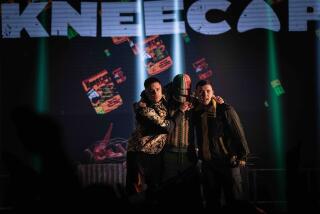Irish Singer Likes C & W Sound Best
- Share via
SAN DIEGO — Sean McVicker is sitting at a table in a far corner of the Harp and Shamrock Irish Pub, sipping from a frothy mug of Guinness Stout and watching a pair of patrons engage in a friendly after-work round of darts.
Grinning like a leprechaun, he slams down his mug on the white tablecloth, which is sprinkled with tiny green shamrocks, and remarks how easy it would be to turn the story of his musical career into a two-act play.
Act One might be called, “An American Cowboy in Ireland.” As a young man, McVicker would don a cowboy hat and, accompanying himself on the guitar, sing twangy American country-western songs in nightclubs around his native Belfast.
Act Two could be titled, “An Irish Bard in America.” Since moving to San Diego in 1978, McVicker has been singing centuries-old Irish folk ballads like “Danny Boy” and “Among the Wicklow Hills” in such local Irish pubs as the Blarney Stone in Clairemont, Ireland’s Own in Encinitas, and the Harp and Shamrock, which he and his wife, Bonnie, opened last September just north of downtown.
“I’ve never been that fond of traditional Irish music, and in Ireland, very few people are,” said the 50-year-old McVicker. “The biggest thing in Irish nightclubs has always been American country-western, and for most of my life, that’s all I played.
“But after coming to San Diego, I soon found myself being offered jobs simply because I was Irish. You have to remember, there are 10 times as many Irish people living in the United States as there are in all of Ireland, and anything that reminds them of their homeland, they like.
“So I had to learn Irish music because I needed the money--it was as simple as that.”
McVicker added that traditional Irish folk music and American country-western are a lot more closely related than most people believe.
“In large part, country-western developed from the old-fashioned Irish folk songs brought to America in the 1800s by Irish immigrants,” he said. “The American Civil War song, ‘Johnny I Hardly Knew You,’ is at least 300 years old. It was written in the small village of Athy, on the southwest coast of Ireland, and was originally about a man who left his wife and child and went off to war.
“When the song was brought over to America, the words were changed and today, everyone thinks it’s an American standard. The same is true of ‘The Streets of Laredo,’ which was written in Ireland two or three centuries ago as ‘The Bard of Armagh.’
“Furthermore, virtually every other popular American country-western song has been somehow influenced by traditional Irish folk music, either lyrically--the story-telling ballad originated in Ireland--or melodically.”
McVicker was just 19 when he gave up a promising career as a pressroom foreman at the Belfast Telegraph newspaper to become a full-time musician.
Throughout the late 1950s and 1960s, he regularly played Belfast nightclubs with his own country-western band and occasionally backed up such touring heavyweights as Buck Owens and Eddy Arnold in major concert halls.
From time to time, McVicker added, he would stray from country-western to dabble in other types of American music. In 1962, he toured Ireland with jazz great Louis Armstrong, and two years later was a founding member of Belfast garage band Them.
Shortly after his departure, Them--fronted by singer Van Morrison--scored a string of American rock hits, including “Here Comes the Night” and “Gloria.”
In 1971, McVicker moved to Montreal, “three years after the troubles began and I decided it was no longer safe for my family to remain in Northern Ireland, where my home had already been shot up several times,” he said.
There, he continued to ply the country-western nightclub circuit until 1978, when he moved again--this time to San Diego.
“I came down here to visit my brother,” McVicker recalled. “But by the time I arrived, he had died, and after the funeral, I decided to stay on.
“I went around to the bars, looking for work, and the first job I found was at a country-western nightclub in El Cajon. On the nights when I wasn’t playing, I would go out (drinking) at the various Irish pubs around town. And as soon as the owners discovered I was a musician, I started getting better offers--on the condition that I would play only traditional Irish folk music instead of country-western.”
McVicker landed his first gig, at the Blarney Stone in Clairemont, with a repertoire of just a half-dozen songs “my mother and father had sung to me when I was young,” he said.
“But over the years, I kept learning more and more old Irish ballads until today, I know at least 2,000 different ones by heart.”
Recently, McVicker said, he has begun lacing his performances with more than a dozen originals, including “Welcome to Ireland,” which he wrote for the Irish tourism bureau, and “The Belfast Waltz,” a cheery tribute to his hometown.
And through years of steady nightclub work he amassed enough money to open the Harp and Shamrock, where he currently performs every Friday and Saturday night with keyboardist Paul Dunn.
“The best thing about owning my own bar is that late at night, when only my friends are left, I can play whatever I want--even American country-western, which I’ve always liked better than Irish folk music,” McVicker said, that big Irish grin returning.
“When you’re working for someone else, you’ve got to play what you’re told to play, and for nearly a decade I’ve been told to play nothing but traditional Irish songs because that’s what the people want to hear.
More to Read
The biggest entertainment stories
Get our big stories about Hollywood, film, television, music, arts, culture and more right in your inbox as soon as they publish.
You may occasionally receive promotional content from the Los Angeles Times.








